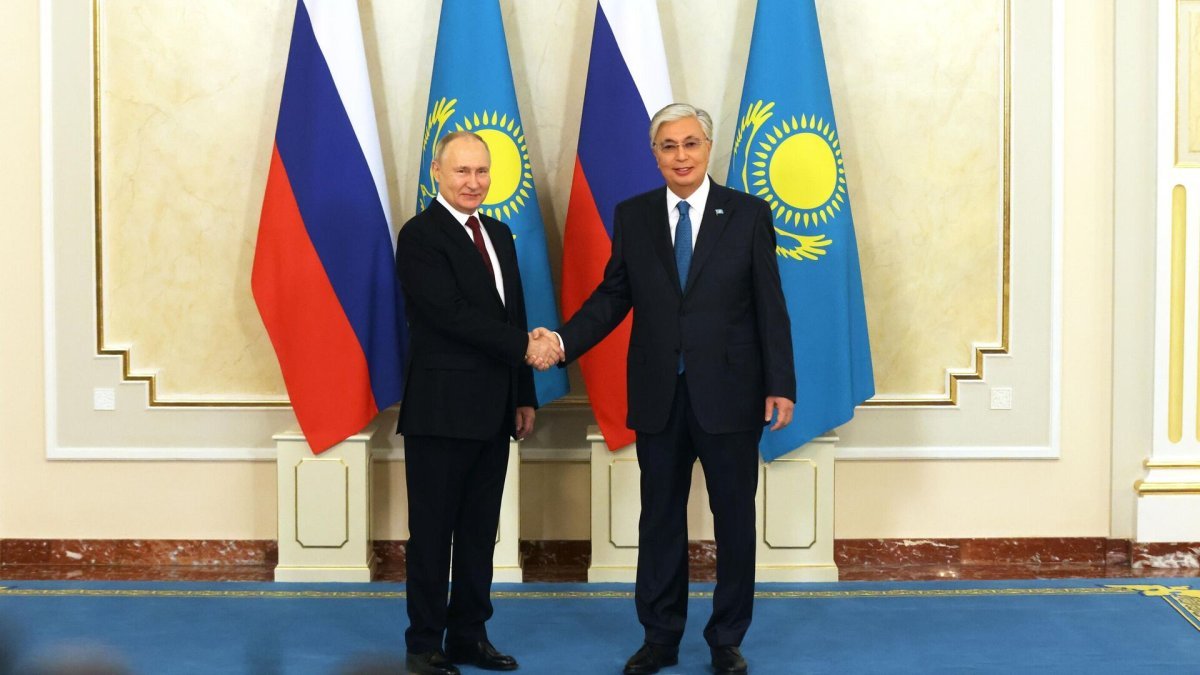Analytical Material from "Voice of America".

Russian President Vladimir Putin recently concluded his visit to Kazakhstan, where he hadn't been for quite some time. The occasion was the regular Forum of Interregional Cooperation, as reported by Sarbaz.kz citing "Voice of America."
However, the focus of the press naturally turned to Putin's meeting with his Kazakh counterpart, Kassym-Jomart Tokayev.
Tokayev has recently undertaken successful voyages to the West, warmly hosting French Prime Minister Emmanuel Macron. Additionally, he has consistently affirmed Kazakhstan's adherence to Western sanctions against Russia.
Beyond this, the Kazakh leader publicly expressed non-recognition of the so-called DPR and LPR. Taken together, according to some observers, this could not escape the Kremlin's concerns.
Arkady Dubnov, an expert on Central Asia, noted in his Telegram channel that, in the context of strained relations between Moscow and the West, Tokayev's "multivector" approach, a significant ally of Russia in the CSTO (Collective Security Treaty Organization) and EAEU (Eurasian Economic Union), is an "expressive gesture underscoring Kazakhstan's independent course."
Moscow perceives such independence with poorly concealed irritation. Comments from pro-government media and various Russian politicians and diplomats often externalize these sentiments, prompting responses from Astana.
However, both leaders, in their public statements, refrained from airing grievances, skirting contentious issues and focusing on the economic aspects of cooperation. What transpired behind the scenes remains a secret to the wider audience.
Meanwhile, Kazakhstan is actively developing diverse ties with the Western world. In Astana, representatives of the Kazakh Ministry of Foreign Affairs and the U.S. Department of State held a meeting within the framework of the 5th annual U.S.-Kazakhstan Enhanced Strategic Partnership Dialogue (ESPD). The ESPD serves as a negotiating platform to advance common priorities and explore opportunities for cooperation. The dialogue covers various topics, including consultations on sanction policies.
Various forces are currently vying for influence over Kazakhstan and Central Asia as a whole, according to Boris Dolgin, an invited researcher at the Tartu University Center for Eastern Studies. In his opinion, it is no longer Russia's sphere of influence but rather a zone of competition for influence.
"In this struggle, besides Russia, Turkey and other countries participate, and the key player is undoubtedly China," he added in a comment to "Voice of America." "Recently, the U.S. and Europe have paid increased attention to the region due to deteriorating relations with Russia over its full-scale invasion of Ukraine and the overall importance of the region."
Against this backdrop, Kazakhstan stands out for being able to pursue an independent multi-vector policy, noted Boris Dolgin. "While Astana's approach is cautious and fundamentally non-confrontational towards other countries, including Russia, Moscow perceives it with irritation. Yes, Russia's influence in the post-Soviet space has significantly decreased, but it can still pose serious problems for its neighbors. However, Tokayev's statements clearly indicate that Kazakhstan intends to observe sanctions against Russia and by no means participate in any of its military-political adventures."
Nevertheless, there is no expectation of Astana attempting to sever ties with Russia, continued the political analyst. "This is indicated by both Putin's recent visit and the prompt visit by the leaders of Central Asian countries to Moscow on May 9 this year. In this context, the growing attention of the West to the region is important. The recent meeting in the U.S. between President Joe Biden and the leaders of all Central Asian countries, Tokayev's visit to Germany, and Macron's visit to Kazakhstan are positive signals indicating a readiness to strengthen mutual ties," Boris Dolgin concluded.
Relations between Moscow and Astana are developing mostly as they have in the past, even though the war in Ukraine has introduced certain corrections, believes Temur Umarov, a research fellow at the Carnegie Moscow Center. However, as he suggests, this factor does not fundamentally change anything. Moscow and Astana remain closely working partners with intertwined economic and political ties.
The structure of the two countries' relationship remains the same, emphasized Temur Umarov. "They support each other in foreign policy, despite existing contradictions. They have quite a few integration projects. In short, while Russia has Belarus as its main ally in the West and China in the East, in Central Asia, Kazakhstan has always been and remains such a partner."
Of course, the Kremlin is partly concerned about Astana's explicitly independent foreign policy, agrees the expert. "But to a certain extent. In Moscow, they understand that relations with Kazakhstan are reliable enough. Kazakhstan does not have too many options on how to behave with Russia. Yes, Moscow's influence in the post-Soviet space has significantly decreased, but it can still create serious problems for its neighbors. However, Tokayev's statements clearly indicate that Kazakhstan intends to observe sanctions against Russia and by no means participate in any of its military-political adventures."
It seems that the Kremlin does not believe that there are significant and insurmountable risks in its relationship with Kazakhstan, reflects Temur Umarov. "They are confident that even some rapprochement between Astana and the West, which we are now witnessing, is not capable of radically undermining Moscow's positions. Even if Kazakhstan, hypothetically, decides to distance itself from Russia, it will be a lengthy process that carries potential dangers for Astana." Therefore, considering that Kremlin policy is becoming more unpredictable and aggressive each year, Kazakhstan is not eager to irritate the nuclear power, concludes the expert.